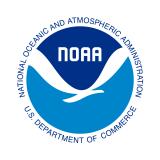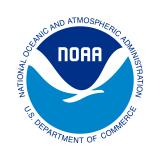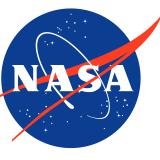Young Scientists Monitor Air Quality Trends During Drought Evolution in the Pacific Northwest
NOAA's National Centers for Environmental Information (NCEI) continues its nine-year partnership with the NASA DEVELOP Program working with early-career scientists and university students. This nationwide program utilizes NASA Earth science satellite data to address diverse environmental issues impacting communities. The NCEI teams also partner with the National Integrated Drought Information System (NIDIS) to support drought-focused projects each year.
Celebrating 25 Years of Partnership
NCEI is proud to have had the pleasure of working with NASA DEVELOP since 2014. Each team of early-career scientists over the past few decades has contributed to a plethora of climate-related issues, including but not limited to, urban tree recovery, drought early warning in the Midwest, water availability in the Sonoran Desert, and more.
Working at NCEI provides young scientists with easy access to NCEI data and our own scientists, along with interpersonal relationships at the organization.
Summer 2023 Term
This summer, the NASA DEVELOP NCEI team will measure trends in air quality in the Pacific Northwest, with a focus on Oregon and Washington. These indicators combine Terra Moderate-Resolution Imaging Spectroradiometer (MODIS) observations (Aqua and Terra). The team will use data from the U.S. Drought Monitor (USDM) and Standardized Precipitation Evapotranspiration Index (SPEI) to evaluate these trends during drought evolution and construct maps—these maps will depict vulnerable air quality areas in Oregon and Washington across the study period.
This team has partnered with the University of Nebraska Medical Center’s Water, Climate, and Health Program, NOAA’s National Integrated Drought Information System (NIDIS), Oregon Health Authority, and Washington State Department of Health. The project team will examine changes in air quality during recent drought conditions in the Pacific Northwest.
Air Quality Climate Team Members
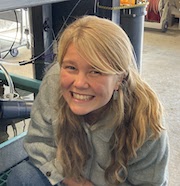 Greta Bolinger is a recent graduate of Bowdoin College. She studied Biology and minored in Earth and Oceanographic Science. As an undergraduate, Greta researched marine macroalgal photosynthesis by cultivating sugar kelp in an experimental sea farm in Harpswell Sound, Maine. In addition to her applied marine science research interests, Greta helped Lawrence Berkeley National Laboratory quantify and publish trends in land use requirements of United States utility-scale solar projects from 2007–2019 using GIS and remote sensing methods. In her free time, Greta values community engagement and enjoys traveling, trail running, and gardening.
Greta Bolinger is a recent graduate of Bowdoin College. She studied Biology and minored in Earth and Oceanographic Science. As an undergraduate, Greta researched marine macroalgal photosynthesis by cultivating sugar kelp in an experimental sea farm in Harpswell Sound, Maine. In addition to her applied marine science research interests, Greta helped Lawrence Berkeley National Laboratory quantify and publish trends in land use requirements of United States utility-scale solar projects from 2007–2019 using GIS and remote sensing methods. In her free time, Greta values community engagement and enjoys traveling, trail running, and gardening.
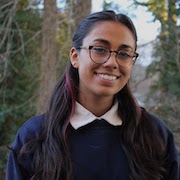 Tallis Monteiro is a first-time participant in the NASA DEVELOP program. Tallis earned a degree in Interdisciplinary Studies from the University of North Carolina at Asheville, allowing her to combine her academic interests in Environmental Science, Human Rights, and International Studies. As an undergrad, Tallis published research that analyzed the long-term ethnoecological impacts of petroleum extraction in the Ecuadorian Amazon on a local and national level. Tallis remained in Asheville to work at Asheville GreenWorks, a community-based environmental nonprofit. She worked for two years as their Environmental Educator, delivering education on local climate resilience, trees, pollinator plant habitats, water quality, and waste reduction to internal programs and community partners. Tallis also co-led GreenWorks’ Youth Environmental Leadership Program, a program introducing BIPOC (Black, Indigenous, and People of Color) youth to the field through educational experience, data collection, and service work focusing on environmental justice. Tallis’ research interests include community-based environmental conservation and local knowledge systems, natural resource management, ecological monitoring, and bioacoustics.
Tallis Monteiro is a first-time participant in the NASA DEVELOP program. Tallis earned a degree in Interdisciplinary Studies from the University of North Carolina at Asheville, allowing her to combine her academic interests in Environmental Science, Human Rights, and International Studies. As an undergrad, Tallis published research that analyzed the long-term ethnoecological impacts of petroleum extraction in the Ecuadorian Amazon on a local and national level. Tallis remained in Asheville to work at Asheville GreenWorks, a community-based environmental nonprofit. She worked for two years as their Environmental Educator, delivering education on local climate resilience, trees, pollinator plant habitats, water quality, and waste reduction to internal programs and community partners. Tallis also co-led GreenWorks’ Youth Environmental Leadership Program, a program introducing BIPOC (Black, Indigenous, and People of Color) youth to the field through educational experience, data collection, and service work focusing on environmental justice. Tallis’ research interests include community-based environmental conservation and local knowledge systems, natural resource management, ecological monitoring, and bioacoustics.
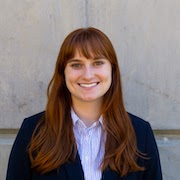 Abby Sgan is currently pursuing a degree in Environmental Studies with a concentration in Earth Science at the University of North Carolina at Asheville (UNCA). As an Earth Science concentration student, she pursues her passion for geology through coursework covering structural geology, mineralogy and petrology, soil science, hydrology and hydrogeology, and water chemistry. She also gained a passion for hydrology during her first DEVELOP term in which she used Google Earth Engine and hydrological modeling to monitor sediment flows in the Chesapeake Bay. Abby hopes to continue using remotely-sensed and in-situ data to study sediment pollution and hydrology in western North Carolina as she enters her final year at UNCA, and carry her undergraduate research experience with her to graduate school and beyond. Abby is excited to be a recipient of the North Carolina Space Grant, which is helping her fund her second term.
Abby Sgan is currently pursuing a degree in Environmental Studies with a concentration in Earth Science at the University of North Carolina at Asheville (UNCA). As an Earth Science concentration student, she pursues her passion for geology through coursework covering structural geology, mineralogy and petrology, soil science, hydrology and hydrogeology, and water chemistry. She also gained a passion for hydrology during her first DEVELOP term in which she used Google Earth Engine and hydrological modeling to monitor sediment flows in the Chesapeake Bay. Abby hopes to continue using remotely-sensed and in-situ data to study sediment pollution and hydrology in western North Carolina as she enters her final year at UNCA, and carry her undergraduate research experience with her to graduate school and beyond. Abby is excited to be a recipient of the North Carolina Space Grant, which is helping her fund her second term.
 Cristina Villalobos-Heredia is from Los Angeles, California and obtained her bachelor's degree in Earth System Science Geography, with a minor in Public Health from University of California (UC) Berkeley. Her professional interest lies within the intersection of Geography and GIS/remote sensing, Public Health, and Urban Development—she hopes to figure out how to incorporate entomology into the mix. During her undergraduate career, she became a part of the Boots Lab team, which researched virus evolution and monitored how the virus evolved in different generations of moth hosts; she explored how genetic diversity and population structure shape parasitic evolution. Additionally, she participated in the UC Nature Reserve program in which her culminating project was a publication that observed how shade can inform the size and distribution of incense cedar in a fire-managed montane forest.
Cristina Villalobos-Heredia is from Los Angeles, California and obtained her bachelor's degree in Earth System Science Geography, with a minor in Public Health from University of California (UC) Berkeley. Her professional interest lies within the intersection of Geography and GIS/remote sensing, Public Health, and Urban Development—she hopes to figure out how to incorporate entomology into the mix. During her undergraduate career, she became a part of the Boots Lab team, which researched virus evolution and monitored how the virus evolved in different generations of moth hosts; she explored how genetic diversity and population structure shape parasitic evolution. Additionally, she participated in the UC Nature Reserve program in which her culminating project was a publication that observed how shade can inform the size and distribution of incense cedar in a fire-managed montane forest.
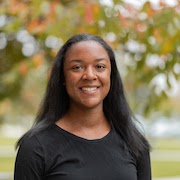
Taylor West recently completed her B.A. in Public Health and a Master’s of Public Policy from the University of Maryland, Baltimore County (UMBC). She is an incoming Ph.D. student in the fall of 2023 at UMBC in the School of Public Policy, specializing in Evaluation and Analytical Methods. Taylor worked with government and research organizations including the Center for Medicare and Medicaid Services, the Hilltop Institute, and the National Oceanic and Atmospheric Administration (NOAA). Her education and work experience have significantly inspired her research interests in rural health policy, Medicaid policy, and the intersection of health, science, and the causes of environmental decline as a result of atmospheric hazards. Taylor enjoys traveling, running, and volunteer activities. She is excited to work with the Pacific Northwest Health and Air Quality team visualizing and synthesizing data and information.


